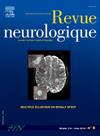COVID-19疫苗在法国大型神经肌肉疾病患者中的安全性以及疫苗接种对其日常生活的影响
IF 2.3
4区 医学
Q2 CLINICAL NEUROLOGY
引用次数: 0
摘要
这项前瞻性观察性研究评估了神经肌肉疾病(NMDs)患者对2019冠状病毒病(COVID-19)疫苗的耐受性及其安全性。在法国NMD (FILNEMUS)网络的55个专家中心接受治疗的患者被要求完成在线问卷,以了解COVID-19疫苗注射状况、不良反应(ae)及其对日常生活活动(adl)的影响。所有患者均随访12个月。我们招募了1020名患有各种nmd的患者;38%为肌病,33%为周围神经病变,20%为肌无力,5%为脊髓性肌萎缩(SMA)。在所有患者中,18%接受了免疫系统修饰疗法。总共进行了1865次疫苗注射。在所有患者中,70.4%的患者没有不良事件影响adl(没有不良事件或轻微不良事件),20.4%的患者报告不良事件影响adl, 9%的患者报告不良事件预防adl, 0.2%的患者需要住院治疗。我们发现不良事件影响adl与NMD类型、生理病理或治疗之间没有关联。然而,发现影响adl的ae的发生与基线时修改的Rankin评分和接种mRNA-1273 (Moderna)之间存在相关性。AE的类型和频率与一般人群相似。我们的研究让人放心;COVID-19疫苗接种对nmd患者是安全的,包括那些患有免疫系统介导性疾病的患者和正在接受免疫系统修饰疗法的患者。严重残疾患者发生不良反应的风险增加,而不良反应会影响adl,但这必须与他们严重感染COVID-19的风险增加这一事实相权衡。我们的mRNA-1273 (Moderna)疫苗发现需要证实;与注射BNT162b2(辉瑞- biontech)的患者相比,很少有患者接受这种疫苗。本文章由计算机程序翻译,如有差异,请以英文原文为准。
The safety of COVID-19 vaccines in a large French series of patients with neuromuscular conditions and the impacts of vaccination on their daily lives
This prospective observational study assessed how well patients with neuromuscular disorders (NMDs) tolerated coronavirus disease 2019 (COVID-19) vaccination, and the safety thereof. Patients treated in 55 expert centres of the French NMD (FILNEMUS) network were asked to complete online questionnaires that explored COVID-19 vaccine injection status, adverse effects (AEs), and the impacts thereof on the activities of daily living (ADLs). All patients were followed-up for 12 months. We enrolled 1,020 patients with various NMDs; 38% with myopathy, 33% peripheral neuropathy, 20% myasthenia and 5% spinal muscular atrophy (SMA). Of all patients, 18% were on immune system-modifying therapies. A total of 1,865 vaccine injections were given. Of all patients, 70.4% lacked AEs impacting ADLs (they experienced no AEs or minor AEs), 20.4% reported AEs compromising ADLs, 9% AEs preventing ADLs and 0.2% AEs that required hospitalisation. We found no association between AEs impacting ADLs and the NMD type, physiopathology, or treatment. However, correlations were found between the development of AEs that impacted ADLs and both the modified Rankin score at baseline and vaccination with mRNA-1273 (Moderna). The AE types and frequencies were similar to those of the general population. Our study is reassuring; COVID-19 vaccination is safe for patients with NMDs including those with immune system-mediated diseases and those who are receiving immune system-modifying therapies. Patients with severe disabilities were at an increased risk of AEs that impacted ADLs but this must be weighed against the fact that they are also at increased risk of severe COVID-19 infection. Our mRNA-1273 (Moderna) vaccine findings require confirmation; few patients received this vaccine compared to those injected with BNT162b2 (Pfizer-BioNTech).
求助全文
通过发布文献求助,成功后即可免费获取论文全文。
去求助
来源期刊

Revue neurologique
医学-临床神经学
CiteScore
4.80
自引率
0.00%
发文量
598
审稿时长
55 days
期刊介绍:
The first issue of the Revue Neurologique, featuring an original article by Jean-Martin Charcot, was published on February 28th, 1893. Six years later, the French Society of Neurology (SFN) adopted this journal as its official publication in the year of its foundation, 1899.
The Revue Neurologique was published throughout the 20th century without interruption and is indexed in all international databases (including Current Contents, Pubmed, Scopus). Ten annual issues provide original peer-reviewed clinical and research articles, and review articles giving up-to-date insights in all areas of neurology. The Revue Neurologique also publishes guidelines and recommendations.
The Revue Neurologique publishes original articles, brief reports, general reviews, editorials, and letters to the editor as well as correspondence concerning articles previously published in the journal in the correspondence column.
 求助内容:
求助内容: 应助结果提醒方式:
应助结果提醒方式:


